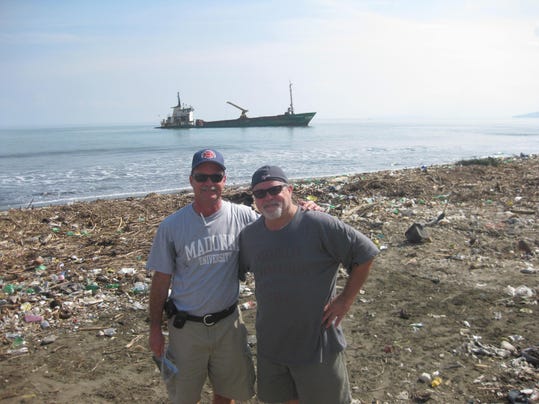
(Photo: Submitted)
Metro Detroiters live just a short drive from many accredited universities offering a wide range of degrees. And despite complaints about Detroit roads, at least they’re passable.
In the Caribbean country of Haiti, which was struck by a massive earthquake on Jan. 12, 2010, there are few universities and none with U.S.-comparable accreditations. Haiti also has many impassable roads, problems with electricity, climate challenges, widespread poverty and political challenges standing in the way of students seeking degrees.
Enter Madonna University’s Haiti Education Leadership Program, or HELP – a three-year online bachelor’s administration program with a community leadership certificate for Haiti citizens. Founded in 2011 by Sister Rose Marie Kujawa, the former president of Madonna University who retired earlier this year, the program boasts two graduating classes of about 25 Haitian graduates each, plus about 15 or more students expected to graduate this May.
The program ties into the Felician Sisters of North America’s mission of providing assistance in the aftermath of the Haiti earthquake, with the aim of creating Haitian leaders who will ultimately improve their country. “It sounds cliché, but you help one person at a time,” said Donald Conrad, associate professor of Business Law & Economics at Madonna, who helped found the program.
HELP is open to English-speaking Haitians who have Internet access and who are high achievers, Conrad explained. The candidates apply and are screened by a Madonna University liaison, and are then interviewed in Haiti by Conrad and other HELP committee members. Some 50 people may come from all over Haiti to Port-au-Prince, the nation’s capital, where interviews take place. It can be a challenge in itself just to travel across the country, Conrad noted.
Merging two cultures
Haiti couldn’t be more different from the United States. The climate is hot, there’s widespread poverty and corruption in government, electricity is not reliable and the roads are narrow and sometimes impassable.
The average annual wage is $300 to $600, said Paul DeNapoli, Madonna’s director of Fire Science, Emergency Management and Occupational Safety & Environmental Health. DeNapoli a retired Livonia firefighter, attended Livonia Franklin High School with Conrad and now works with him on Madonna’s HELP committee.
“The poverty is oppressive, the heat is oppressive, everything’s oppressive,” said Conrad. “But the people are as friendly and as positive as can be. Nobody complains.”
“The challenges to these students are extremely high,” said Conrad, explaining that students have family crises and work commitments that sometimes get in the way of their school work.
The upshot of these challenges is that many Haitians have a hard time fitting into structured, deadline-driven American academics. Many of them lose contact with professors while dealing with medical issues or family problems, and it can be difficult to keep them on track to graduate, DeNapoli said.
The future of HELP
The HELP program is now in its fifth year, and Madonna University is committed to continuing it. Many organizations go to Haiti, provide some assistance and leave, said DeNapoli, but Madonna wants to build a sustainable program.
Madonna is looking for benefactors to assist with tuition costs – students are asked to pay about $200 per semester, but that’s nowhere near the cost of administering the program – as well as program alumni to donate their time and talents. The goal is to form an alumni association Madonna can tap for program recruiting and possibly financial sponsorship, so that the university can break even on administration costs.
“The goal would be that the program would take off on its own,” DeNapoli said. There may even come a time when alumni can teach some of the courses, he said.
Madonna also has its eye on hospitality and tourism in Haiti – a budding industry for the Caribbean nation as it rebuilds after the earthquake. The university would like to begin a hospitality and tourism degree program, and has had discussions with the Port-au-Prince Marriott Hotel about a partnership.
In the meantime, Conrad and DeNapoli continue to travel to Haiti a couple times a year to interview candidates and look into opportunities for expanding the program. They also look forward to May, when the Haitian students travel to the United States for graduation.
Conrad enjoys getting the group together for a barbecue at his house, but as the program continues and graduating classes become larger, he may need to find another venue, he said. Either way, he enjoys getting the students together, hearing their stories and wondering what they’ll do next.
Community leadership
Since the HELP program is designed to foster Haitian leaders who will build a stronger nation, the students’ final community leadership course includes a community service internship.
Haitian students have chosen everything from working on chicken farms to teaching kids how to play basketball to working on gender equality and human rights. Most students report that the experience made them want to do more community service and to encourage more of it among fellow students.
“It was an opportunity for us to see how we can help our country moving forward, and we will encourage other people to start doing community service,” one student said in a report.
“Regardless of their field of studies, I believe all students at the university should perform a service learning project,” said another. “It is a culture that I want to teach as well in my community, as schools in Haiti do not really encourage community work.”
Conrad is impressed with the students’ resilience in the face of challenges and foresees them changing Haiti for the better. “I always say that I wouldn’t be surprised if a (HELP) graduate is president of Haiti one day,” he said.